Great Debate: Team Rest-of-Canada v. Équipe Québec
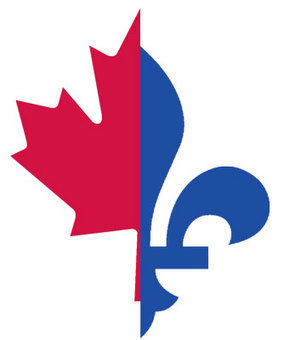 As I’ve alluded to before, I used to work at a Very Large Bookstore in downtown Toronto and my co-workers and I often devised games to entertain ourselves on slow days.
As I’ve alluded to before, I used to work at a Very Large Bookstore in downtown Toronto and my co-workers and I often devised games to entertain ourselves on slow days.
A popular one amongst the hockey fans on staff was: Who would win in a best-of-seven series between an all-time all-star lineup of players from Quebec and the Rest of Canada?
I mean, let’s not kid ourselves. If you pit an all-time Canadian team against an all-time from any other country team it’s a pretty straight forward answer: the guys with the maple leaf on their chest. Seriously, only an all-Soviet/Russian team would avoid the sweep.
But pitting Canadians against Canadiens? That is a tough call. At first glace, you've got to give the advantage to Quebec's goaltenders. Jacques Plante. Patrick Roy. Martin Brodeur. Roberto Luongo. La Belle Provence has a sterling history of producing world-class goalies.
Naturally, defence appears to favour the Rest of Canada. Naming off the National Hockey League's best defencemen of all time reads a lot like the bench of Team ROC.
Up front is where things get tricky. Gretzky against Lemieux. The Rocket versus Stevie Y. It's a dead heat.
The rules are simple:
- Each team gets four lines of forwards, six defencemen and three goaltenders.
- Any player from the National Hockey League’s history is eligible.
- These theoretical rosters are composed of the players in their primes. Bobby Orr's knees are in perfect shape and Michel Goulet hasn't been concussed.
- It’s Rest-of-Canada versus Quebec, not French Canada versus English Canada. For example, Dion Phaneuf, a Francophone, could theoretically play for Rest-of-Canada, as he’s from Edmonton. Similarly, Doug Harvey is from Montreal so he’d play for Quebec, even if he is maudit anglais.Of course, English against French can be a fun exercize as well, but we’re trying to keep things politically sensitive on this blog.
- No, Brett Hull doesn’t count.
I want to know who you think would win, and why. If you’re feeling ambitious, post your rosters as well.
Here are my picks for the rosters, as well as the winner
Team Rest-of-Canada
Forwards:
C - Wayne Gretzky
Steve Yzerman
Gordie Howe
Sidney Crosby
Mark Messier
Bobby Hull
Phil Esposito
Ron Francis
Joe Sakic
Mark Recchi
Doug Gilmour
Adam Oates
Defence:
Bobby Orr
Larry Robinson
Larry Murphy
Paul Coffey
Scott Stevens
Chris Pronger
Goaltenders:
Terry Sawchuck
Ken Dryden
Glenn Hall
Équipe Québec
Forwards:
C-Maurice Richard
Henri Richard
Mario Lemieux
Marcel Dionne
Guy Lafleur
Luc Robitaille
Denis Savard
Pierre Turgeon
Gilbert Perrault
Jean Ratelle
Jean Beliveau
Michel Goulet
Defence:
Ray Bourque
Doug Harvey
Denis Potvin
Serge Savard
Guy Lapointe
Jacques Laperriere
Goaltenders:
Patrick Roy
Martin Brodeur
Jacques Plante
Winner: Team Rest-of-Canada in seven games.
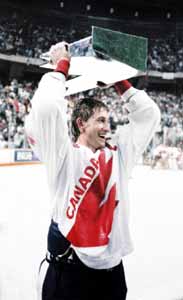 Led by captain Wayne Gretzky, Team Rest-of-Canada would win because they would abuse their biggest advantage: defence.
Led by captain Wayne Gretzky, Team Rest-of-Canada would win because they would abuse their biggest advantage: defence.
With goalies and forward pretty even, the largest disparity is clearly at the blue line. Yes, Bourque and Harvey are two of the best defenders of all time, but they aren’t the best.
Bobby Orr is the best offensive-defenceman of all time and Larry Robinson is the best defensive-defenceman ever. That one-two punch, coupled with the depth of their rearguard corps gives ROC a real advantage.
Rest-of-Canada’s defence is also much bigger than the average forward for Équipe Québec. Although the Richards might be able to slip by the likes of Paul Coffey and Larry Murphy a few times, they’d be exhausted when it comes time to lace ‘em up for Game 7.
Also, ROC's defence would be able to jump up into the attack. Obviously, Orr was capable of scoring just as many points as any forward for Quebec, and Coffey would be able to keep La Belle Provence's defence honest too.
One of the big surprises is that ROC is actually pretty good between the pipes. Yes, the case can be made that one of Roy, Brodeur or Plante are the greatest goaltender of all time - but the same can be said of Sawchuk. Further, Dryden and Hall aren't exactly slouches. Sawchuk, coupled with the reliable defence in front of him, would be more than enough to stop the best that Quebec has to offer.
Up front would still be a dead heat. The Rest-of-Canada couldn't possibly match the flair and play-making ability of Quebec, but with talented and tough forwards like Howe, Gilmour and Recchi bearing down on them on the forecheck, the blue-and-white would feel rushed and pressured on most of their shifts.
The Arenas Rule
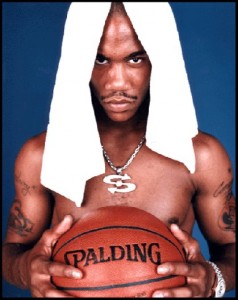
With an unseemly Arenas Rule Point rating of 8, no NBA executive should consider Stephon Marbury as an addition to their team ever again.
As I was writing Tuesday’s piece on why players leave Toronto’s sports teams, I began to toy with the idea of athletes who have moved from team to team, and came to the conclusion that there’s a point where any general manager should see a player’s team history as a red flag.
I call this policy the Arenas Rule, after recently disgraced Washington Wizards star Gilbert Arenas who, thanks to his criminal gun charges, will likely be joining his third National Basketball Association team sometime this summer.
Here’s the technical language:
Arenas Rule (also known as the Shaq Threshold) – Any athlete who has played for three or more franchises in their professional career is not worth signing as a free agent or trading for under any circumstances.
The Rule only applies to athletes who’ve been previously selected to their league’s all-star teams and/or won an individual award (MVP, Rookie of the Year, Triple Crown, Defensive Player of the Year, etc.)
The logic is simple. Although this former all-star might pay dividends when playing, they’re not worth the trouble off the court/ice/playing surface of your choice. It relies on the assumption that, like a first date who has to count off their exes on their fingers, they’re not worth the time or effort.
Presumably, this veteran player has a nagging injury, is locker room poison, has an unwieldly contract, has lost a step due to age, is crazy or a combination of all of the above. Somehow, someway, they are damaged goods.
Each team they play for adds an extra Arenas Rule Point on to their evaluation, increasing the risk of the move exploding in the GM’s face. Any athlete that has an ARP of 3 or higher is bad news and is going to severely damage the team’s chemistry, salary or reputation.
There are some stipulations that can both add or subtract from an athlete’s ARP score:
Nash Caveat (also Seller’s Remorse) (ARP rating = 0) – Referring to NBA All-Star Steve Nash who was traded from the Phoenix Suns to the Dallas Mavericks only to re-sign with the Suns as a free agent, the Caveat stipulates that a player shall not have a second tenure with a team count against their ARP score.
By all accounts, Nash is a not just a great player, but a great person. So likeable that even Canadians comment on how nice he is, the Suns welcomed him back with open arms, having regretted ever letting him get away. A player shouldn’t be punished for a GM’s hasty decision making.
Millbury Allowance (ARP rating = -1) – Used judiciously, the Millbury Allowance forgives players who were traded in incredibly lopsided deals.
An acknowledgment that not all GMs are created equal, the Allowance refers to former New York Islanders GM Mike Millbury who regularly traded away his best players for terrible returns. For example, Roberto Luongo is one of the best goalies active in the NHL today, but has an ARP rating of 3. He’s been moved from the Islanders to the Florida Panthers and then to the Vancouver Canucks. It’s not his fault that Millbury didn’t know what he had. The Millbury Allowance restores Luongo’s ARP rating to an acceptable 2.
Davis/Trump Proviso (ARP rating = -1) - A team move, merger or a league’s collapse shall not count against a player’s ARP rating, as the extra teams listed on their resume were because of the financial and/or mental instability of the team or league’s leadership.
Herschel Walker is one of the best running backs in National Football League history. However, he would have been the best running back in United States Football League history and led the New Jersey Generals to several championships, had the league not folded.
Of course, he went on to play for four NFL teams, flagging him as an undesirable addition to any roster. (Although makes him an ideal candidate for the Ultimate Fighting Championship.)
Lindros Rider (ARP rating =+0.5) - If a player demands to be traded before their rookie training camp, an ARP point of 0.5 shall be added to their total score on the assumption that they are a budding prima donna.
In his young career Eli Manning has already earned a 1.5 ARP because he refused to play for the San Diego Chargers. Instead, he was traded to the New York Giants.
The demand should have been a warning to former Giants GM Tom Coughlin that Manning would suffer from erratic play, crippled by human emotions that his brother Peyton was not programmed with.
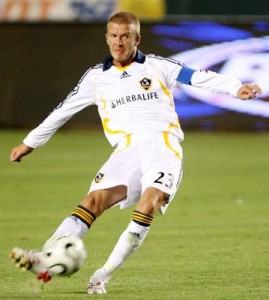
David Beckham has earned an ARP rating of 6, having played for Manchester United, Preston North End, Real Madrid, the Los Angeles Galaxy (+2) and AC Milan.
Green Card Caution (ARP rating = +1)
– Any athlete who has played professionally outside of North America will have an extra ARP assigned to their rating in addition to the standard penalty.
Players will not be penalized for beginning their careers outside of North America. However, should they play more than 10 games in North America and then move to a professional league outside of the United States or Canada, the rule applies.
If labour issues halt a North American league’s regular season, this rule is suspended for the duration of the work stoppage.
NOTE: For soccer players, replace “North America” with “Europe”.
What’s that? Stephon Marbury is the starting point guard with the Shanxi Zhongyu Brave Dragons? Yeah, you better believe that he’s crazy.
Neon Deion Condition (ARP rating = x1.5) = Applies to any “two-sport” athlete who participates in more than one professional sports league in a single calendar year.
Bo Jackson could’ve been a fantastic baseball player. Or a fantastic football player. He chose both. The decision cost the Los Angeles Raiders and Kansas City Royals an all-star because he required hip replacement surgery at the ripe old age of 28, when he should have been in his athletic prime.
The Royals (or Raiders) should’ve turned him away the second they realized he was going to be playing in another league.
The next time you hear that your favourite team is pursuing a veteran free agent or trading for a seasoned all-star, consider the Arenas Rule and do some math with the various stipulations. If you come up with an ARP of 3 or higher, you should be concerned.
My weekend in junior hockey, Feb. 26-28
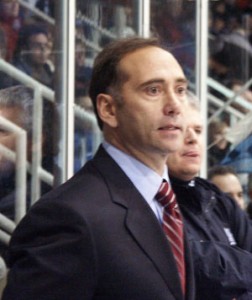
Richard Martel, head coach of the Chicoutimi Sagueneens won his 570th game on Sunday, a QMJHL record.
This weekend, when I wasn’t obsessing over the Olympics, I was all about the Quebec Major Junior Hockey League.
It was an incredible couple of days with Moncton’s Nicola Riopel setting a goaltending record Saturday night, only to be topped less than 24 hours later by Drummondville’s Jake Allen. On top of that, Sunday saw Richard Martel become the winningest coach in league history when his Chicoutimi Sagueneens dropped the Baie-Comeau Drakkar 3-1.
But first, let’s talk about goaltending.
As a gross generalization, each league within the Canadian Hockey League produces particularly strong types of players. The Western Hockey League’s rough and tumble style lends itself to defensively minded players who are always ready to drop their gloves. The Ontario Hockey League produces tight, disciplined players who focus on positioning and off-puck work. The QMJHL? It’s all about the goalies.
The league is a factory for superstar goaltenders – Felix Potvin played for the Chicoutimi Sagueneens and Roberto Luongo played for the Val-d’Or Foreurs and the Acadie-Bathurst Titan.
As good as those two are, they’re not even the best to come out of the QMJHL. Patrick Roy and Martin Brodeur, the two best goaltenders ever came from the league, setting the standard for all netminders worldwide.
So when Nicola Riopel of the Wildcats passes all those names on his way to the second-longest shutout streak in league history it’s kind of a big deal. Riopel’s record ended at 179 minutes 59 seconds Saturday night.
However, it was an even bigger deal when Jake Allen of the Voltigeurs passed Riopel the very next day. Allen lasted nearly ten minutes longer, going 188 minutes 47 seconds without giving up a goal.
Really, it’s incredible stuff, and shows that these two players will be around for a long time.
Of course, it was all over-shadowed by Martel’s accomplishment of winning 570 games as a coach. Martel’s never won the President’s Cup as a head coach, but he did win it as an assistant way back in 1990 with the Sagueneens who were backstopped by a young Potvin.
I had the pleasure of speaking with Martel this past weekend for a feature story, and I was impressed with his humility and dedication to the young men he teaches. I also spoke to league commissioner Gilles Croteau who went on at length about what an asset Martel is to the league and Canadian hockey in general.
What a great weekend for hockey in Quebec.
Friday, Feb. 26 2010
QMJHL – P.E.I. drops Chicoutimi 4-3 in shootout
The Chicoutimi Sagueneens earned a point for their coach Richard Martel, but not a coveted milestone.
Cody Linteau had the only goal in the shootout as the P.E.I. Rocket disappointed the Sagueneens 4-3 in Quebec Major Junior Hockey League action Friday night. (See more...)
OHL – Tanski, Hodgson help Battalion defeat Majors
Cody Hodgson's return to the Brampton Battalion could not have been more timely.
Scott Tanski and Hodgson combined for three goals and six points to spark the Battalion to a 4-0 victory over the Mississauga St. Michael's Majors on Friday night in the Ontario Hockey League. (See more...)
WHL – Bloodoff brothers both score as Kelowna beats Oil Kings
Three streaks came to an end in Edmonton Friday night.
Brothers Lucas and Evan Bloodoff scored as the Kelowna Rockets snapped a five-game losing streak with a 4-0 victory over the Oil Kings in Western Hockey League action. (See more...)
Saturday, Feb. 27 2010
QMJHL – Wildcats edge Halifax as Riopel makes QMJHL history
Nicola Riopel has made his mark in Quebec Major Junior Hockey League history.
Riopel made 21 saves as the Moncton Wildcats edged the Halifax Mooseheads 4-3 on Saturday. (See more...)
OHL – Erie stays in playoff hunt with win over Ottawa
The struggle for playoff spots continues in the Ontario Hockey League.
Anthony Luciani and Greg McKegg scored twice as the Erie Otters dropped the Ottawa 67's 7-1 Saturday night. (See more...)
WHL – Stanton scores twice as Warriors edge Bruins
The Moose Jaw Warriors have made the most of their time at home.
Defenceman Ryan Stanton scored twice as Moose Jaw hung on to beat the Chilliwack Bruins 3-2 in Western Hockey League action Saturday. (See more...)
Sunday, Feb. 28 2010
QMJHL – Martel wins 570th as Chicoutimi sinks Baie-Comeau
Sunday was a record-setting day in the Quebec Major Junior Hockey League.
Chicoutimi Sagueneens' head coach Richard Martel earned his 570th career victory, the most in QMJHL history, as Chicoutimi sank the Baie-Comeau Drakkar 3-1. (See more...)
OHL – Lopes scores two as Majors prevail over Oshawa
The Mississauga St. Michael's Majors are firing on all cylinders as the playoff window is closing on the Oshawa Generals.
Ryan Lopes scored a pair of goals and defencemen David Corrente and Blake Parlett had four-point games to power Mississauga to a 7-4 triumph over Oshawa in Ontario Hockey League action Sunday afternoon. (See more...)